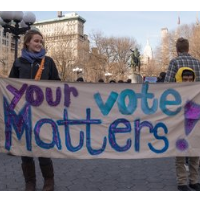Most Americans Believe Their Vote Won’t Count
 (photo: Albin Lohr-Jones, Getty Images)
(photo: Albin Lohr-Jones, Getty Images)
By Giovanni Russonello, New York Times
Fewer than half of Americans are very confident that their vote for president will be counted correctly — and most say their ballot will not matter anyway because the political process is so dominated by corporate interests.
These are among the results of a PRRI poll released on Tuesday showing a nation that is deeply ambivalent about the electoral process.
Americans are almost evenly divided on whether fraud or voter repression is a bigger problem, despite many studies showing that fraud is almost nonexistent nationwide.
The findings suggest there may be at least some audience for Donald Trump’s claims that the presidential election could be “rigged.”
And they dovetail with recent trends. In a Gallup survey in August, 36 percent of Americans said that voter fraud would most likely be a major problem this election, more than those who said it would not be an issue. That was up significantly from a pre-election Gallup poll in 2004, when just 24 percent expressed serious concern about fraud.
“Most pernicious, I think, is the fact that Americans are basically divided on which is the bigger problem, voter fraud or disenfranchisement,” said Robert P. Jones, the chief executive of PRRI.
In the poll, 41 percent said voter suppression was a bigger issue, while 37 percent named fraud.
“All the studies we have point to voter fraud being essentially a negligible problem,” Jones said. “Yet people are just as worried about that as they are about something we have a long history of, which is eligible voters being denied the right to vote. That’s certainly a perception problem.”
Just 43 percent of Americans in the survey expressed a great deal of confidence that their vote would be counted correctly. By nearly 30 points, supporters of Hillary Clinton were more likely to feel confident than Trump backers.
But political independents were the most skeptical, with just over a third expressing a great deal of confidence.
Independents were also among the most likely to say that the influence of wealthy interests overpowered voting.
Fully 57 percent of all Americans, and nearly two-thirds of independents, agreed that “politics and elections are controlled by people with money and by big corporations,” so it does not matter if they vote.
At 66 percent, young people are among the most likely to feel pessimistic about the worth of their vote. “This goes along with a lot of what we know about millennials, that they distrust institutions in general,” Jones said. “But it doesn’t bode well for civic participation going forward.”
Trump’s repeated insistence that the election could be rigged brings to a head more than a decade of work by conservative groups to combat what they say is a widespread problem: ballots being cast by ineligible or repeat voters.
The Supreme Court in 2013 annulled a major provision of the Voting Rights Act, and this election, 14 states have new laws in place that restrict who can cast a ballot, according to the Brennan Center for Justice.
“In many different ways, voters rightly perceive that the system isn’t working that well — whether it’s gerrymandered districts leaving little competition, or a campaign finance system giving big money even greater power,” said Michael Waldman, president of the Brennan Center and author of “The Fight to Vote.”
“They see these voting issues sometimes along the same lines,” Waldman added. “The public is not wrong that there’s a general, vital need to upgrade our democracy. It just is the case that voter fraud isn’t actually one of the problems.”
The survey depicts a nation broadly dispirited with the political process. About three-quarters of Americans say the country is going in the wrong direction.
And for both Clinton and Trump, a majority of their supporters say they are casting ballots mostly in opposition to the other candidate, not in favor of their own. Asked which candidate better understands the problems of people like them, voters were most likely to say neither, with about 4 in 10 selecting this option.
The poll was conducted Sep. 1-27, online and via telephone, among 2,010 respondents to NORC’s AmeriSpeak Panel, which uses a probability sample. The margin of sampling error is plus or minus 3 percentage points.
To Learn More:
The Divide over America’s Future: 1950 or 2050? (by Betsy Cooper, Ph.D., Daniel Cox, Ph.D., Rachel Lienesch and Robert P. Jones, Ph.D., PRRI)
Justice Dept. to Dispatch Fewer Election Observers Due to Supreme Court Gutting of Voting Rights Act (by Eric Tucker, Associated Press)
Hacking Threats, Voting Restrictions, and Trump’s Call for Poll Monitors Generate Election Day Concerns (by Christina A. Cassidy, Associated Press)
International Observers to Monitor U.S. Election for Voter Suppression (by Noel Brinkerhoff and David Wallechinsky, AllGov)
- Top Stories
- Unusual News
- Where is the Money Going?
- Controversies
- U.S. and the World
- Appointments and Resignations
- Latest News
- What If China Invaded the United States?
- Donald Trump Has a Mental Health Problem and It Has a Name
- Trump Goes on Renaming Frenzy
- Trump Deports JD Vance and His Wife
- Trump Offers to Return Alaska to Russia






Comments